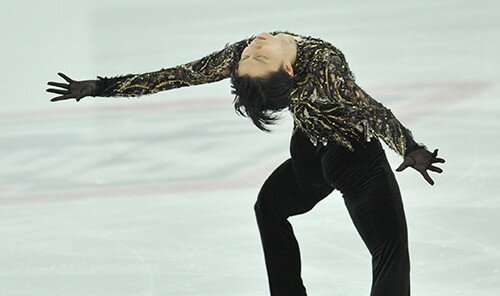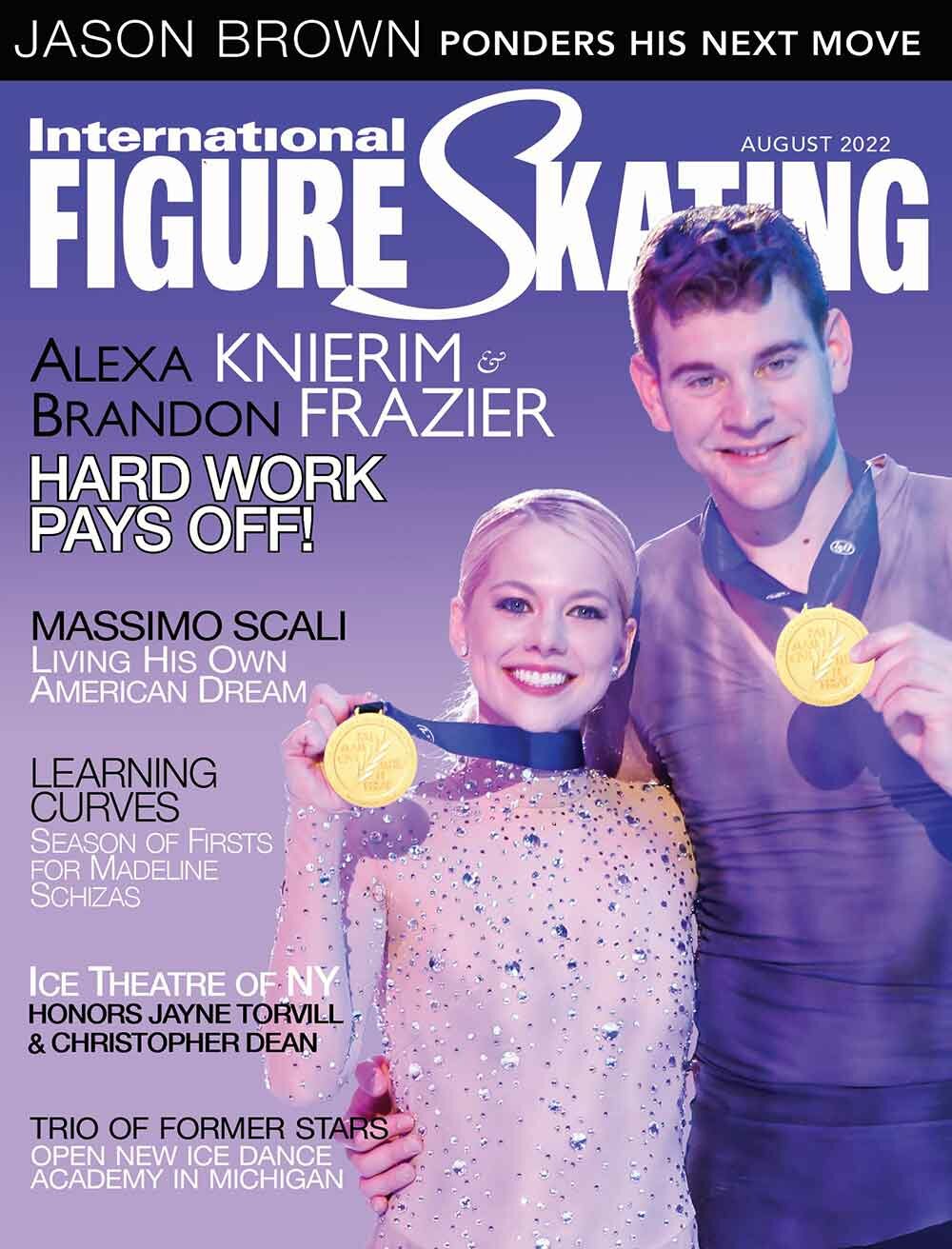
Photo: Susan D. Russell
The skating king from the Land of the Rising Sun (Japan) dominated the men’s competition in the Land of the Midnight Sun (Finland) this weekend.
After winning the short program with a clean performance and a new World record score, Yuzuru Hanyu was fighting the elements through much of his free skate on Sunday. It is rare to see minus GOEs on his protocols, but today was one of the exceptions.
The 23-year-old opened his “Origin” long program with an under-rotated quad loop. The subsequent quad Salchow and triple loop were clean but he was hit with another under-rotation and a minus GOE for the quad toe. Hanyu’s next jump — a quad toe-triple Axel sequence — was a first in skating annals, and though it was not downgraded it also received a handful of negative GOEs.
Hanyu was visibly disappointed when his score of 190.43 points flashed overhead. “Really?” he asked. Nonetheless, the two-time Olympic champion earned 297.12 points in total, securing a runaway victory with a 39.14-point margin.
“First of all I am really glad. I never actually won my first Grand Prix in a season — excluding the Junior Grand Prix — so I am so happy and pleased I won here,” Hanyu said. “I am also pleased that in the short and long I was able to stand on my feet. Not all the jumps were perfectly landed, but at least I did not pop any jumps and I did not fall. I was pleased that I went over 100 for short and for the long I was aiming for over 200. I was fighting my condition. It was hard … but finally I can say I beat myself.”
When asked about the quad toe-triple Axel combination, Hanyu said his goal is to do it without a hop between the two jumps. “I was trying to practice without the hop between the toe and Axel. When I am fresh I feel so much confidence.”
His long program this season is a tribute to his idol Evgeni Plushenko. “I hope Evgeni was watching. If he was watching my program I hope that he feels happy and excited,” said Hanyu. “I know yesterday Johnny (Weir) was watching (his short program Otoñal). Of course, they are not exactly perfect programs but I am hoping to perfect them.
“There is a lot more to the choreography in my long program that I was not able to show today. For instance, there is a part in my choreography sequence where there is an Ina Bauer and I use my arm in an unusual way. That is my tribute to (Plushenko’s) program. The rest I want to leave to the spectators to discover what elements are tributes to (Plushenko’s) original program. The editing of the music is a little different and with my own original program I am trying to express my admiration of him.”
With the long program 30 seconds shorter this season, skaters are still adjusting to the new format. Hanyu does not want to leave anything out and is “aiming for the best performance and records.”
Though he has attempted a triple Axel-quad toe sequence in practice — a combination that Plushenko was once capable of executing — Hanyu said he “would rather practice a quad Axel if I have the choice.”
When asked if the possibility exists to eliminate triple jumps from his repertoire, Hanyu responded in the negative. “That is probably not possible in my future, but at my skating club there is a skater called Stephen Gogolev who already does most of the quad jumps and I am really looking forward to his future.
“I was practicing the quad Axel before Autumn Classic but after that competition I realized I have other priorities. I want to perfect my programs and I feel that as long as I am competing, winning is my goal and that is the most important thing for me. I am hoping to do it (the jump) this season but probably after Japanese nationals.”
Skating Finland estimated their retrievers had collected almost 1000 Pooh bears from the ice. Hanyu said he would donate some of them, and “maybe some bears are going back to the forest and maybe some bears are going to some children. I actually have not decided. I really appreciate all the mascots but it is too hard to take all bears home. But, I can bring all of the power of the fans to Japan through the mascots.”
Michal Březina picked up his second Grand Prix silver medal of the season and is all but assured a place at the Grand Prix Final in December. If he earns a place in Vancouver it will mark his first appearance since 2011.
Březina’s long program, set to “I’m a Man” and “Thunderstruck,” also had technical issues. He opened with a quad Salchow-double toe loop combination, but went down on the triple Axel, a jump he rarely misses. He landed the jump in combination with a double toe later in the program. The California-based skater earned a season high score of 164.67 points for the free and a combined total of 257.98.
“I am happy I finished the program the way I did,” Březina said. “It felt really good to perform except for the mistake at the beginning. I have no clue how that happened — I usually don’t miss triple Axels.”
Březina is working on a quad toe but it is not yet at same level of consistency as his quad Salchow. He has also trained a quad Salchow–triple Axel in practice. “I do it at the beginning of a practice session but I can imagine how hard it is to do it in competition in the second half of the program,” he said.
He also admitted that the new four-minute format is challenging “because they took away one jump and 30 seconds. Jumps take about a second. We don’t really have that much time to breathe. Taking away the 30 seconds is harder for us but probably it is more interesting for the audience.”
Exclusive post-competition video interview with Michal Březina
South Korea’s Jun-Hwan Cha — who was obviously under the weather — skated into third place with 243.19 points. The 17-year-old, who is also coached by Brian Orser and Tracy Wilson, executed a quad toe loop and seven further triples in his “Romeo and Juliet” program. It was his second bronze medal finish on the Grand Prix circuit this season.
“I’m really happy about my skating today. I competed last week at Skate Canada but my condition is not really good,” he said as he tried not to cough. “I made a big mistake at the beginning of my program, but I really enjoyed my skating today. I worked hard until the end of the program.”
Cha said the quad toe and quad Salchow are still a work in progress. “The toe is a new jump for me this season. Last year I was really screwing up a lot and shaky with the quad Salchow, so this year I am trying to make sure the quad toe and quad Salchow are 80-90 percent. The jumps are really challenging, so for me, I want to go step by step.”
Russia’s Mikhail Kolyada rose two spots to finish fourth with 238.79 ahead of Boyang Jin of China, who dropped from third to fifth with 227.28 points. Andrei Lazukin of Russia finished sixth (218.22).
RELATED CONTENT:
2018 CHALLENGER SERIES





